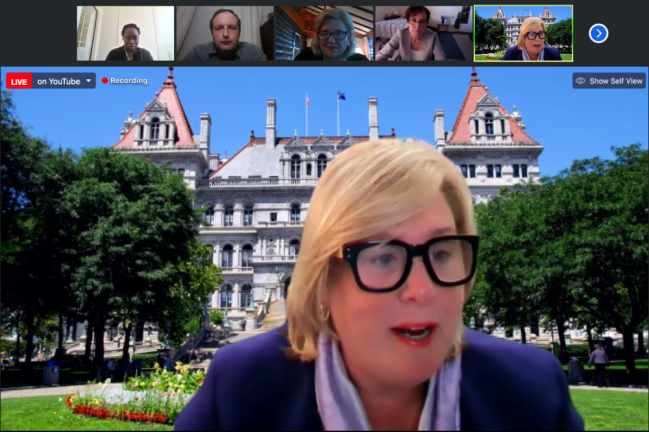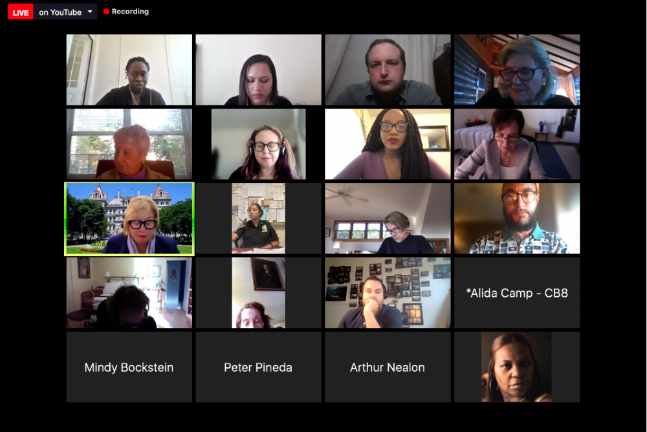The Shadow Pandemic
Community Board 8 discusses domestic and intimate partner violence during the pandemic


Community Board 8’s Women and Families Committee met via Zoom to speak about the rising rates of Domestic and Intimate Partner Violence during the pandemic, and what the community can do to meet the needs of victims. The panel of speakers, including law enforcement and representatives from the District Attorney’s offices, discussed the forms that domestic violence can take, and shared stories of how resources adapted to combat something that too often goes unseen throughout the pandemic.
No one group is exempt from domestic or intimate partner violence, and domestic violence disproportionately affects communities of color and other marginalized groups. The CDC estimates that severe physical domestic violence affects about one in five women, and about one in seven men during their lifetime. The panel discussed the forms that abuse can take, including sexual, emotional, and physical abuse, and abuse through coercive control, defined by committee co-chair Peggy Price as “control of an intimate partner, either by preventing the partner from engaging in activities or access to finances, or by forcing the partner into unwanted behaviors, through intimidation humiliation, or other means.”
New York State Assembly Member Rebecca Seawright called domestic violence “a shadow pandemic” and spoke about how the New York State domestic and sexual violence hotline “reported a 33% increase in calls for April 2020, compared to April 2019.” She made sure to explain that the total number of reported domestic violence incidents “doesn’t include all of the cases which go unreported from fear of retaliation.” Seawright also noted that she is “co-sponsoring legislation to establish coercive control ... as a class A felony.”
Sgt. Sumay Lee of the 19th Precinct added that law enforcement had noted “a decrease in the amount of domestic incidents that were reported ... for 2021, they have decreased by about 100 calls.” in the 19th Precinct. The 19th Precinct has also been actively reaching out to the community through domestic violence outages, which Lee described as “domestic violence officers set up a table anywhere in our precinct that has the heaviest foot traffic, and we hand out pamphlets, and we try to make the community know that we are around, make them know that it’s okay, you guys can call us.”
Other speakers spoke about how to assist victims directly. Rachel Teicher of the National Network for Safe Communities shared that domestic violence is “fairly ubiquitous. It’s like walking down the street in New York City and seeing an advertisement for storage. It’s there you, just don’t always see it.” Teicher described COVID as “Unfortunately a perfect storm ... abuse thrives in isolation.” With community members unable to leave their homes due to the shutdown, more people than ever were in vulnerable situations with their abusers.
“Code Words and Signals”
Teicher also discussed the creative ways people have found to combat isolation, including things such as “safety planning ... code words and signals.” One hand sign went viral on Tik Tok earlier this year. Pamela Blandino of the New York County District Attorney’s office remarked that the pandemic has taught her office “a lot about the work that we do, and the ability to do it under such strange circumstances.” With her office making sure that victims knew that they could access the DA’s office whenever they needed throughout the pandemic, even when the physical office was closed.
Karen Benjamin Hamlet of the Manhattan District Attorney’s office shared that her office “really had to vamp up the way that we communicate” with victims during the pandemic, by being flexible with when they could be contacted, and using their phones as “warm lines” for victims, as they weren’t operational 24 hours like a hot line is.
Hamlet described that throughout the pandemic, her office made sure to assist victims by going “to where they were mentally. We went to where they were emotionally, and we partnered with them on this journey. We made sure that we could support them on any level that they would allow us, and we made sure that they understood that we were here for them.”
The community board further discussed ways to educate children on domestic violence in order to break the cycle of abuse, as well as where New York’s domestic violence resources and legislation could be improved. The board passed a resolution in support of Assembly Member Seawright’s bill to make coercive control a felony, noting that the language used should include that all gender identities, instead of specifically women, can be victims of domestic violence.
After a year that has challenged every facet of how people live, Hamlet wanted the community to know that even from home, “We are always looking for ways to interrupt domestic violence because we have to. It adapts, it gets in, it’s insidious. We definitely make sure that we are just as clever, and as just as determined, to support our survivors.”
If you or someone you know is experiencing domestic violence, help is available. Call 1-800-942-6906 or 1-800-621-HOPE (4673), or text 1-844-997-2121.